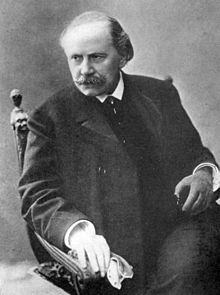- Cléopâtre
-
This article is about Massenet's opera. For Georges Méliès' short, see Cléopâtre (1899 film). For the last Egyptian pharaoh, see Cleopatra VII. For other uses, see Cleopatra (disambiguation).
Jules Massenet  Operas
Operas- La grand'tante (1867)
- Don César de Bazan (1872)
- Le roi de Lahore (1877)
- Hérodiade (1881)
- Manon (1884)
- Le Cid (1885)
- Esclarmonde (1889)
- Le mage (1891)
- Werther (1892)
- Thaïs (1894)
- Le portrait de Manon (1894)
- La Navarraise (1894)
- Sapho (1897)
- Cendrillon (1899)
- Grisélidis (1901)
- Le jongleur de Notre-Dame (1902)
- Chérubin (1903)
- Ariane (1906)
- Thérèse (1907)
- Bacchus (1909)
- Don Quichotte (1910)
- Roma (1912)
- Panurge (1913)
- Cléopâtre (1914)
- Amadis (1922)
Cléopâtre is an opera in four acts by Jules Massenet to a French libretto by Louis Payen. It was first performed in at the Opéra Monte-Carlo on February 23, 1914, nearly two years after Massenet's death.
Cléopâtre is one of three operas by Massenet to be premiered posthumously; the others are Panurge (1913) and Amadis (1922). The piece has seen limited revival since its premiere and has a modest modern recording history.
Contents
Performance history
Though the opera was written for the mezzo Lucy Arbell, the role of Cléopâtre was created by the soprano Maria Kuznetsova. The first American performance took place in Chicago on January 10, 1916 with Kuznetsova. The first New York performance was on January 23, 1919 with Mary Garden. It was revived at the Massenet Festival in Saint-Étienne in 1990 with Kathryn Harries in the title role. This production yielded a live recording (Koch Swann). In 2004, a concert version was performed at the Liceu in Barcelona with Montserrat Caballé.
Roles
Role Voice type Premiere Cast[1], 23 February 1914
(Conductor: - Léon Jehin)Cléopâtre mezzo-soprano Maria Kuznetsova Marc-Antoine baritone Alfred Maguénat Octavie soprano Lilian Grenville Spakos tenor Huchet-Rousselière Amnhès baritone Pierre Clauzure Charmion soprano Carton Ennius baritone Feiner Severus baritone Ghastau L'Esclave de la Porte baritone Gasparini Amados mute Magliani A voice baritone Lozé Synopsis
The story concerns the ill-fated love of Cléopâtre and Marc-Antoine. Marc-Antoine sees Cléopâtre for the first time following the conquering of Egypt and is instantly entranced by her beauty. Dismissing his obligations in Rome, Marc-Antoine goes with Cléopâtre, and even after returning to fulfill his promise of marriage to Octavia, he is lured back by lust and jealousy. Being told, falsely, that Cléopâtre has been killed, Marc-Antoine falls on his own sword and is then brought to Cléopâtre. As she watches him die by her side, she pulls a poisonous snake from a basket of fruit and clutches it to her breast.
Noted arias
- Act III - Cléopâtre: "J'ai versé le poison dans cette coupe d'or"
References
- Notes
External links
Categories:- Operas
- 1914 operas
- French-language operas
- Operas by Jules Massenet
- Opéra de Monte-Carlo world premieres
- Operas set in Egypt
Wikimedia Foundation. 2010.
